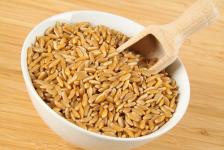What are the Advantages of Kamut?
Kamut may be tasty, but is it better for you than other strains of wheat? Nutrition Diva explains.
Monica Reinagel, MS, LD/N, CNS


Answer. Kamut is a relative of modern hybridized wheat, one of the so-called “ancient grains” that are popular these days. Ironically, Kamut isn’t ancient at all; it’s actually the trademarked brand of a private company. Although the developers once claimed that Kamut® was cultivated from ancient grains recovered from an Egyptian tomb; they’ve since back-pedaled on this story and now say that it is simply a modern descendant of an ancient Egyptian grain.
The Kamut grain is quite a bit larger than the more widely used types of wheat, with a golden color and sweeter, nuttier taste. In fact, kamut contains about 15 times more sugar than wheat! It’s also somewhat higher in certain nutrients (including thiamin, iron, and zinc) but lower in others (including fiber, vitamin E and calcium). Kamut is somewhat higher in protein than most (but not all) strains of wheat. At the end of the day, however, the nutritional differences aren’t really big enough to have an impact on your overall nutrition—especially if you’re eating grains in moderation, as I suggest.
See also: The Whole Truth About Whole Grains
Kamut often said to be “easier to digest” but it’s a little hard to pin down exactly what that means. Kamut does contain gluten, the protein that causes problems for people with Celiac disease—and should not be consumed by folks with diagnosed gluten intolerance. However, the gluten in kamut is in a slightly different form than that in modern wheat. The lore is that people who don’t “tolerate” wheat can often tolerate kamut—but this is purely anecdotal and may include a healthy dose of placebo effect.
See also: Pros and Cons of Gluten Free Diets
Bottom line on Kamut: Feel free to enjoy it—in moderation—as you would any other whole grain, but don’t expect any miracles!
Kamut photo from Shutterstock

